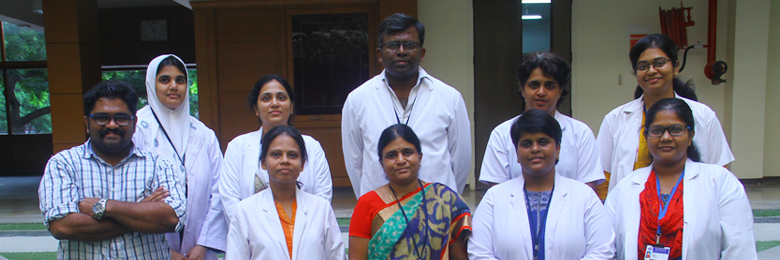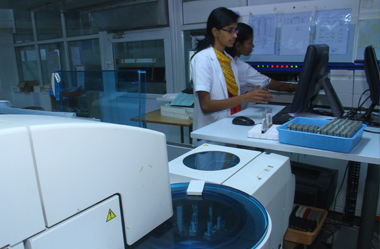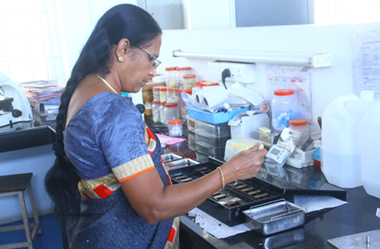Biochemistry

Dr Yegna Narayana Iyer was the first head of Biochemistry. The clinical laboratory of the Department of Biochemistry works 24×7 to provide timely and reliable reports on a wide range of biochemical parameters. The results are reviewed by highly experienced and qualified staff before they are released. Regular performance checks are conducted by running control samples to keep track of the accuracy, precision and reproducibility of the analytical procedures at the department, headed by Dr G. Jeyachandran.

Dr. G. Jeyachandran, Head of the Department of Biochemistry
Biorad, an internationally recognised quality assurance programme, has ranked this department as amongst the best in the country. The clinical biochemistry laboratory has recently been granted accreditation by the National Accreditation Board for Testing and calibration Laboratories (NABL), an autonomous body that recognises technical competence of labs. It is the only laboratory among all the medical colleges affiliated to the Tamil Nadu Dr MGR Medical University that has been accredited by NABL and is considered as a ‘model lab’ for audit by international bodies such as APLAC and ILAC.
Academics
The undergraduate training of the department includes theory classes which are interactive and student friendly, clinically relevant practical sessions and OSPE/clinical case studies to trigger interest in the concepts of biochemistry. The faculty do provide additional academic support for slow learners and feedback is regularly given to students on their performance in examinations.
The overall competence and academic excellence of post graduates is enhanced by training them in undergraduate teaching, clinical biochemistry laboratory procedures & interpretations, total quality assurance and research projects. They are encouraged to participate and present research papers in conferences.
Facilities
The department is equipped with instruments to support undergraduate and postgraduate training & research.
The Clinical Biochemistry Laboratory of PSG Hospitals Diagnostic Centre offers routine and special tests to the patients. The Laboratory tests are accredited by the National Accreditation Board for Testing and Calibration Laboratories (NABL), Department of Science and Technology, New Delhi. The Clinical Biochemistry Laboratory, with state-of-the-art equipment works round the clock. The laboratory is equipped with fully automated analysers for routine chemistry, hormone assays, tumour markers and special proteins, critical care analytes, glycosylated haemoglobin. There is also a fully automated electrophoretic system. Sample barcoding and inter-phasing of the analysers make the system error free. Transport of samples collected at different wards and outpatient sample collection department by a pneumatic system and release of reports in the Hospital Information System within a short time enable early diagnosis and treatment.
Research
- Oral Iron Therapy- Changes in Plasma Peroxide & Anti Oxidant Enzyme Levels
- Effect of sun salutation and nadi shodhan Pranayama on glucose homeostasis and oxidative stress in type 2 diabetics
- Serum Magnesium: Prophet of Diabetic Complications
- The Clinical utility and diagnostic efficacy of an emerging parameter-Cystatin C
- Analysis of adenosine deaminase in patients with liver disease
- Anti Oxidant Status in Seizures Patients
- Plasma myeloperoxidase levels in patients with end-stage renal disease
- Serum Paraoxonase activity in chronic renal failure
- Postprandial Paraoxonase (PON) Activity in type-2 Diabetes
- Impact of Supplementation of Food Based Anti Oxidant Mix on the Antioxidant Status of Selected Breast Cancer Patients
- Butyrylcholinesterase Activity & Risk Factors for cardio Vascular Disease
- Role of Ischemia Modified albumin in the Early Diagnosis of Acute Myocardial Infarction
- Clinical Significance of Cardiac Troponin T Level in Chronic Kidney Disease: Predictive Value for Cardiovascular risk 2009-2010
- Role of NT pro BNP as a Marker of cardiac Failure in Chronic Renal Disease
- Dyslipidemia in critically ill patients
- Serum Paraoxonase activity in critically ill sepsis patients
- Oxidative stress and inflammatory markers in pregnancy induced hypertension
- Association of oxidative stress parameters and thyroid status during pregnancy
- Plasma myeloperoxidase levels to predict prognosis in patients with acute coronary syndrome
Studies on Oxidative stress, Insulin resistance and Paroxanase in NASH as a predictive risk factor for cardiovascular disease
- Evaluation of Oxidative and nitrative stress in pancreatitis
- Histopathological changes and Oxidative stress assessment to study bacterial translocation in chronic liver disease
- Effect of selemium enriched eggs on reducing Oxidative stress in sports women
- Study on the effect of spirulina on lipid peroxidation in young healthy rats
- Supplementation of tomato juice and effect of lycopene on nutritional status, Oxidative stress and physical fitness of selected athelets
- Serum Paroxanase in fatty liver
- Effect of antiplatelet therapy on glycemic indices, biochemical markers of oxidative stress and inflammation in type 2 diabetes mellitus patients
- Plasma myeloperoxidase levels in type 2 diabetes mellitus

















